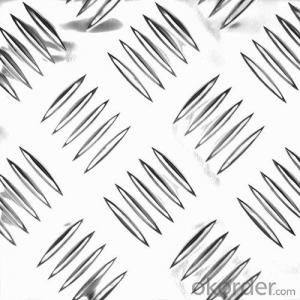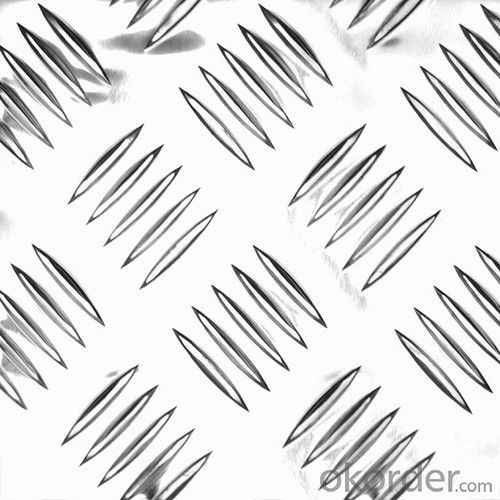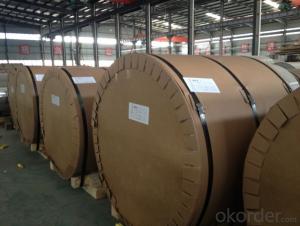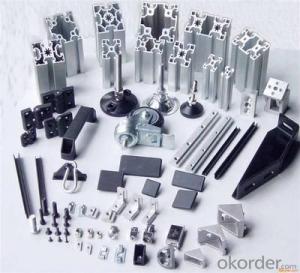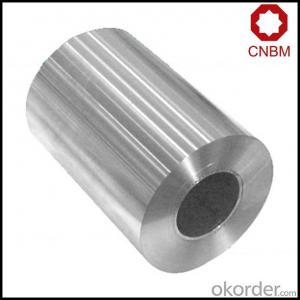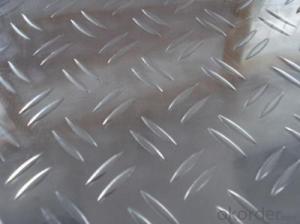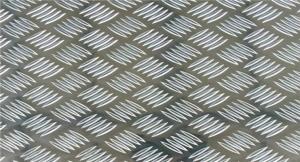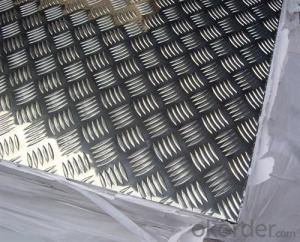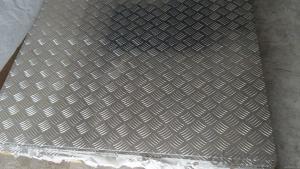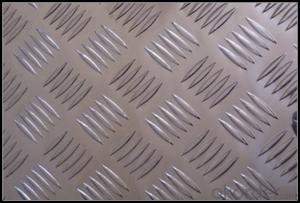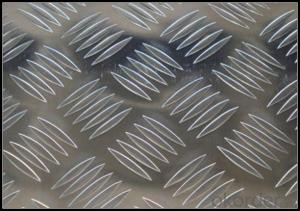040 Aluminum Coil - Aluminium Checkered Sheet with Five Bars
- Loading Port:
- China Main Port
- Payment Terms:
- TT OR LC
- Min Order Qty:
- -
- Supply Capability:
- -
OKorder Service Pledge
OKorder Financial Service
You Might Also Like
Product Description:
1. Specifications of Aluminum Checkered Sheet
| MAIN SPECIFICATION OF ALUMINUM CHECKERED SHEET | |
| Alloy | AA1XXX (AA1050, AA1060, AA1070, AA1100 etc.) |
| AA3XXX (AA3003, AA3004, AA3005, AA3105 etc.) | |
| AA5XXX(AA5052) | |
| Temper | H14,H18,H24, H26, H32 |
| Thickness | 0.2mm-100mm |
| Width | 30mm-1700mm |
| Standard | GB/T 3880-2006 |
| Special specification is available on customer's requirement | |
2. Usage/Applications of Aluminum Checkered Sheet
The embossed aluminum sheet are widely used for decorative purposes in construction, packing and appliance. It is also very commonly used for anti-splippery purposes in vehicles and public places.
3. Packing & Delivery of Aluminum Checkered Sheet
Packaging: Seaworth package
Shipment: The goods will be delivered in not more than 40 days after getting the buyer's payment.
- Q: Are aluminum coils suitable for manufacturing cookware?
- Yes, aluminum coils are suitable for manufacturing cookware. Aluminum is a popular choice for cookware due to its excellent heat conductivity, which allows for even heating and efficient cooking. It also has a lightweight and durable nature, making it easy to handle and long-lasting. Additionally, aluminum is resistant to rust and corrosion, making it an ideal material for cookware that is frequently exposed to water and heat. However, it is important to note that uncoated aluminum cookware may react with certain acidic or alkaline foods, leading to a metallic taste. To overcome this, many aluminum cookware manufacturers use non-stick coatings or anodized finishes to prevent food reactions and improve the durability of the cookware. Overall, aluminum coils are a suitable material for manufacturing cookware, but it is essential to consider the specific requirements and coatings needed for different types of cookware to ensure safety and optimal performance.
- Q: What is the typical price gap between purchasing new aluminum coils versus used ones?
- <p>The price difference between new and used aluminum coils can vary significantly based on factors such as the quality of the used coils, market demand, and the specific grade of aluminum. On average, used aluminum coils can be 20-50% cheaper than new ones. However, this is a broad estimate and actual prices can fluctuate. It's essential to check current market prices and consider the condition of the used coils before making a purchase decision.</p>
- Q: What are the safety considerations when handling aluminum coils?
- When handling aluminum coils, there are several safety considerations that need to be taken into account. Firstly, it is important to understand that aluminum coils can be quite heavy, especially when dealing with larger sizes. Therefore, proper lifting techniques should be used to avoid strain or injury to the back and muscles. This may involve using lifting aids or getting assistance from others when moving or positioning the coils. Secondly, aluminum coils can have sharp edges or corners, which can cause cuts or puncture wounds if not handled carefully. It is advisable to wear appropriate personal protective equipment, such as gloves, when handling the coils to protect against any potential injuries. Additionally, aluminum is a highly conductive material for electricity and heat. Therefore, it is crucial to ensure that the coils are not in contact with any live electrical sources or exposed to open flames or intense heat. This can help prevent electrical shocks or fires, which could pose significant safety risks. Furthermore, proper storage and stacking of aluminum coils is essential to prevent accidents. Coils should be stored in a stable and secure manner, ensuring that they are not at risk of falling or rolling over. Proper stacking techniques, such as using appropriate supports or pallets, should be employed to prevent them from toppling over. Lastly, it is important to be aware of any specific safety guidelines or regulations provided by the manufacturer or relevant authorities when handling aluminum coils. Following these guidelines can help ensure the safe handling and use of the coils and minimize the risk of accidents or injuries. In conclusion, the safety considerations when handling aluminum coils include using proper lifting techniques, wearing personal protective equipment, avoiding contact with electrical sources and heat, ensuring proper storage and stacking, and following manufacturer guidelines. By taking these precautions, the risk of accidents or injuries can be significantly reduced.
- Q: Can aluminum coils be used in the production of architectural façades?
- Yes, aluminum coils can be used in the production of architectural façades. Aluminum is a popular material choice for façades due to its durability, lightweight nature, and aesthetic appeal. The use of aluminum coils in façade production allows for easy customization, as they can be easily formed and shaped into various designs and profiles. Additionally, aluminum is resistant to corrosion, making it suitable for exterior applications. It also offers excellent thermal and acoustic insulation properties, contributing to energy efficiency and soundproofing. Overall, aluminum coils provide a versatile and efficient option for the production of architectural façades.
- Q: Can aluminum coils be used in architectural applications?
- Aluminum coils, indeed, find application in architectural projects. The construction industry frequently employs aluminum due to its adaptability, endurance, and ease of manipulation. Architects often make use of aluminum coils for roofing, cladding, and facades, thanks to their malleability in creating diverse forms and proportions. Furthermore, these coils can be coated with various finishes to improve their visual appeal and safeguard against weathering and discoloration. Ultimately, given their blend of utility, attractiveness, and durability, aluminum coils have become a favored option for architectural purposes.
- Q: What is the acceptable range of temperatures for aluminum coils in terms of their functionality and durability?
- <p>The temperature range for aluminum coils can vary depending on the specific application and alloy type. Generally, aluminum coils can operate effectively within a range of -200掳F to 500掳F (-129掳C to 260掳C). For most industrial applications, the working temperature is between -40掳F to 300掳F (-40掳C to 150掳C). However, it's important to consult the manufacturer's specifications for the exact temperature limits of a particular aluminum coil, as these can differ based on the alloy and intended use.</p>
- Q: What are the potential applications of coil-stucco aluminum coils?
- Coil-stucco aluminum coils have a wide range of potential applications due to their unique properties and characteristics. Some of the potential applications of coil-stucco aluminum coils include: 1. Building and construction: Coil-stucco aluminum coils are commonly used in the construction industry for various purposes. They can be used for roofing, cladding, and siding applications, providing durability, versatility, and aesthetic appeal to buildings. The stucco finish on the coils adds texture and enhances the overall appearance of the building. 2. Transportation industry: Coil-stucco aluminum coils are also used in the transportation industry for manufacturing trailers, truck bodies, and other vehicles. Aluminum is lightweight, yet strong, making it an ideal material for reducing the weight of vehicles and increasing fuel efficiency. The stucco finish on the coils provides additional strength and resistance to scratches and abrasions. 3. Appliances and electronics: The coil-stucco aluminum coils are suitable for manufacturing appliances and electronics due to their corrosion resistance and thermal conductivity. Aluminum coils are commonly used in refrigerators, air conditioning units, and other household appliances. The stucco finish provides an added layer of protection against wear and tear. 4. Signage and advertising: Coil-stucco aluminum coils are widely used in the signage and advertising industry for making outdoor signs, billboards, and displays. The stucco finish enhances the visibility of the signs by reducing glare and reflections. Additionally, aluminum is a weather-resistant material, making it suitable for outdoor applications. 5. Packaging industry: Coil-stucco aluminum coils find applications in the packaging industry as well. Aluminum is a non-toxic and non-reactive material, making it suitable for packaging food and beverages. The stucco finish adds an attractive texture to the packaging material, making it visually appealing. 6. Industrial applications: Coil-stucco aluminum coils are used in various industrial applications such as manufacturing equipment, storage tanks, and processing systems. The excellent corrosion resistance, high thermal conductivity, and strength make aluminum coils a preferred choice in industries where these properties are crucial. Overall, the potential applications of coil-stucco aluminum coils are diverse and extensive. The unique properties of aluminum, combined with the stucco finish, make these coils suitable for a wide range of industries, including construction, transportation, appliances, signage, packaging, and industrial applications.
- Q: I heared the aluminum weakens or melts.
- Mercury readily combines with aluminium to form a mercury-aluminum amalgam when the two pure metals come into contact. However, when the amalgam is exposed to air, the aluminium oxidizes, leaving behind mercury. The oxide flakes away, exposing more mercury amalgam, which repeats the process. This process continues until the supply of amalgam is exhausted, and since it releases mercury, a small amount of mercury can “eat through” a large amount of aluminium over time, by progressively forming amalgam and relinquishing the aluminium as oxide. Aluminium in air is normally protected by a thin layer of its own oxide, which is not porous to mercury. Mercury coming into contact with this oxide does no harm. However, if any elemental aluminium is exposed (even by a recent scratch), the mercury may combine with it, starting the process described above, and potentially damaging a large part of the aluminium before it finally ends.
- Q: Can aluminum coils be welded or soldered?
- Yes, aluminum coils can be welded or soldered.
- Q: I need to write as many interesting facts as i can about aluminum for a thing for school, any help?
- it is a lighter metal . you can prepare many alloys with it
Send your message to us
040 Aluminum Coil - Aluminium Checkered Sheet with Five Bars
- Loading Port:
- China Main Port
- Payment Terms:
- TT OR LC
- Min Order Qty:
- -
- Supply Capability:
- -
OKorder Service Pledge
OKorder Financial Service
Similar products
Hot products
Hot Searches
Related keywords
